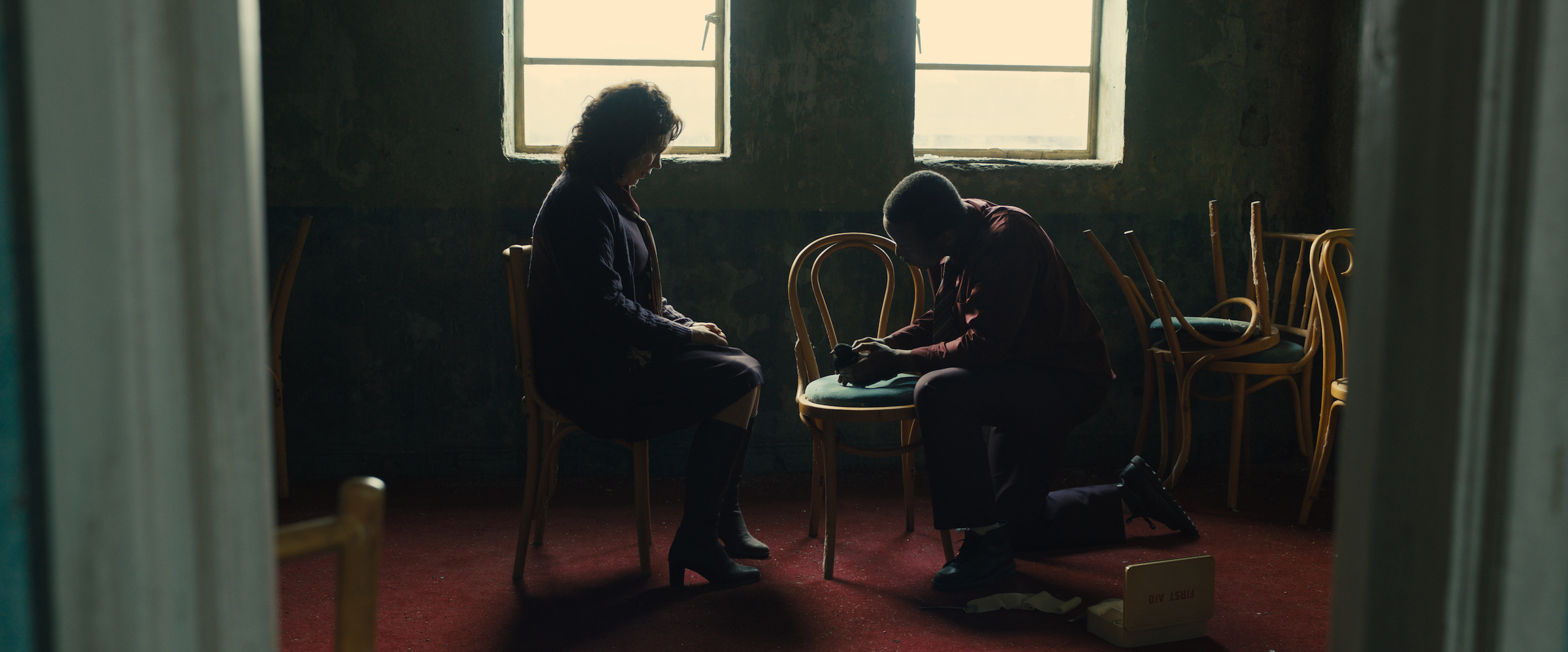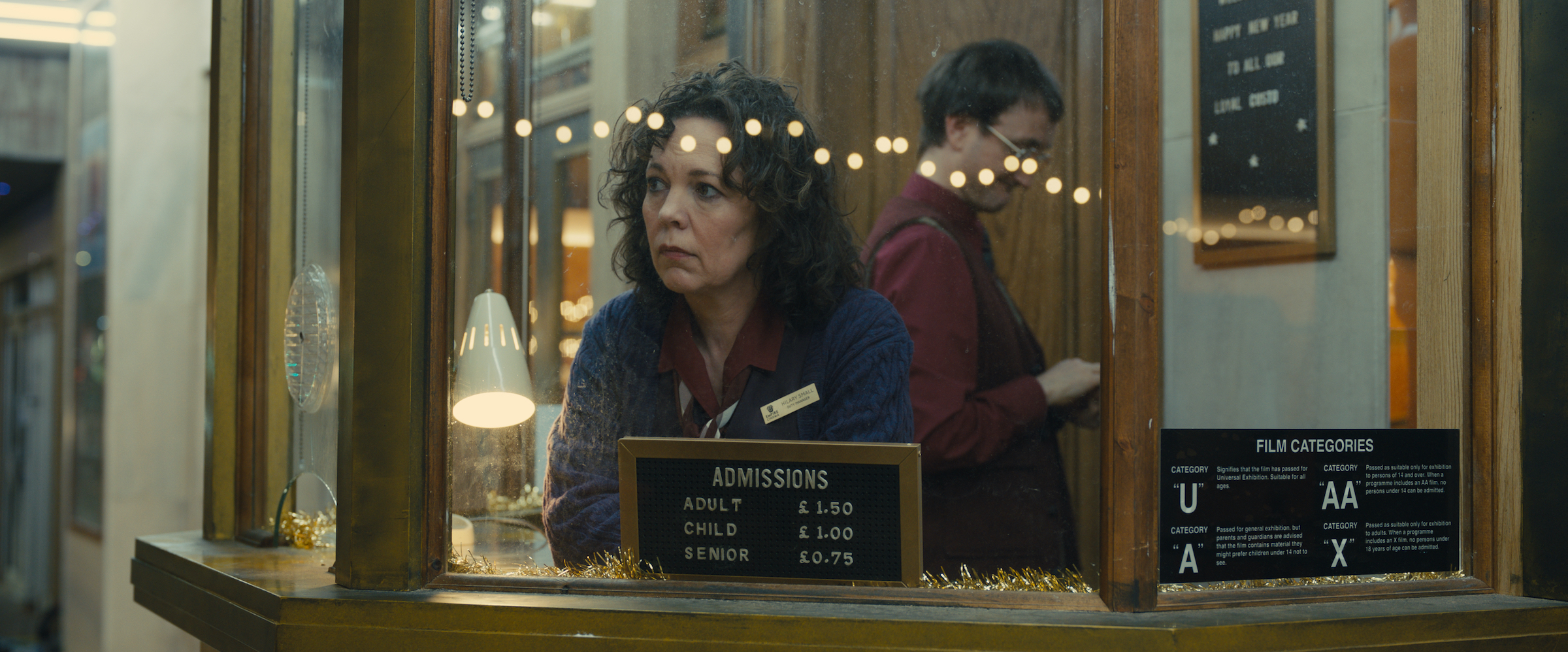Director Sam Mendes and cinematographer Roger Deakins are a formidable pair. The obsidian-sleek elegance of the 2012 Bond adventure Skyfall, the desolate grandeur the elegiac war drama 1917, the suburban angst that seems to hang in the very air in 2008’s Revolutionary Road: when it comes to working out the look of a film, these two are a good team, and that’s certainly true of Empire of Light, in which Olivia Colman plays the manager of a movie theater in an English seaside town, circa 1981, whose chronic loneliness abates for a time with the arrival of a new employee, Stephen (Micheal Ward). Empire of Light is gorgeous to look at: the theater itself, one of those early-20th century beauties—complete with a vast, airy ballroom, no longer in use—is more than just the movie’s setting. It’s like a benevolent ghost, still proud of its grand, curving staircases and regal light fixtures. Deakins treats this setting with as much tenderness as if it were a faded movie star, taking one last chance at a comeback.
But the movie, which Mendes also wrote, doesn’t live up to its setting. There’s a lot going on in Empire of Light—and yet somehow not quite enough. Colman’s Hilary has been working at the theater forever, to the point where she’s taken for granted, particularly by its owner, Donald (Colin Firth)—he regularly invites Hilary into his office for fast, grunting sex that obviously leaves her unfulfilled. But everything changes when Stephen joins the team of employees. (It also includes Toby Jones as a persnickety projectionist and Tom Brooke as a senior staff member who keeps a close eye, perhaps too close, on everything and everyone.)

Stephen is a gentle soul, perceptive and smart. When Hilary first shows him around the theater, he insists she take him to its abandoned upper floors, which include more screens, now unused, and that ballroom—a wounded pigeon has found its way in. Stephen removes one of his socks and turns it into a soft little cocoon bandage for the bird. Hilary seems to get along well enough with all her co-workers, but she can see Stephen is different. He makes her feel less lonely; the two become friends and, eventually, unlikely lovers: Stephen is so much younger, in addition to being cool and handsome. He could have anyone, but he feels true affection for Hilary.
As you can imagine, this isn’t going to end well. Hilary doesn’t stop to think how different life is for Stephen, who’s Black, until she sees him hassled by racist white thugs on the street. And eventually, she finds herself struggling with the impossibility of their relationship; that and other factors—including, apparently, the rage she still harbors toward her abusive mother, as well as nearly all men—trigger a mental breakdown.

This is some heavy-duty stuff. Still, the picture feels light and inconsequential, even when it strives to address some of the thorny social issues of its era, chiefly the rise of white nationalism in Great Britain in the early 1980s. Some of the performances are lovely: As Stephen, Ward is a warm, generous presence; even if he and Hilary are an odd couple, age-wise, their chemistry is fully believable. And Colman is one of our finest actresses, with one of our great faces. It’s always a pleasure to watch her: As Hilary, one minute she’s radiant with open-hearted delight; the next her face is clouded with an anxiety that neither she nor we can define.
But even though Colman has played a range of roles since she made her breakthrough with The Favourite, it may be time to stop casting her as the middle-aged loner. Empire of Light also suffers from undue sentimentality. Because of its movie-palace setting, you can bet there’s going to be a scene underscoring the “power of cinema.” At one point Stephen, who both loves movies and has also taken an interest in projection, tells Hilary, “That beam of light—it’s an escape.” Anyone who loves movies knows this is true, and in some ways, it’s charming that Mendes is so nakedly open about it. On the other hand, people who love movies also know cornpone dialogue when they hear it. Empire of Light spells out lots of things that it might have conveyed with a glance, or a line of understated dialogue. It stumbles under the weight of its intentions, and not even its majestic setting can save it.
More Must-Reads from TIME
- Donald Trump Is TIME's 2024 Person of the Year
- Why We Chose Trump as Person of the Year
- Is Intermittent Fasting Good or Bad for You?
- The 100 Must-Read Books of 2024
- The 20 Best Christmas TV Episodes
- Column: If Optimism Feels Ridiculous Now, Try Hope
- The Future of Climate Action Is Trade Policy
- Merle Bombardieri Is Helping People Make the Baby Decision
Contact us at letters@time.com